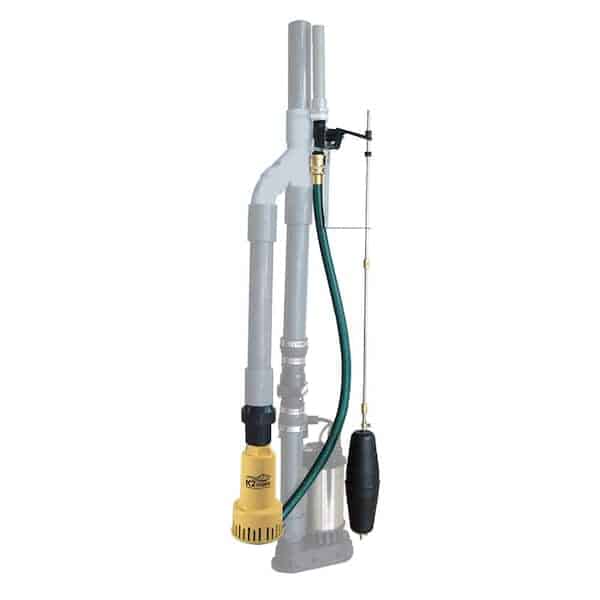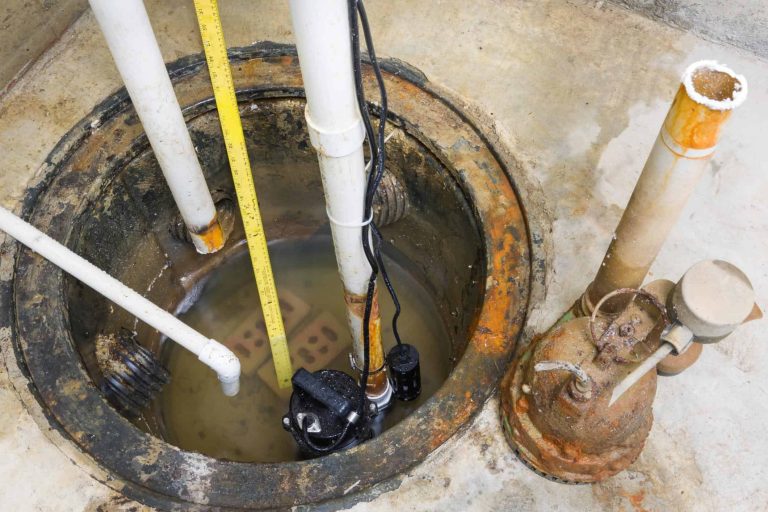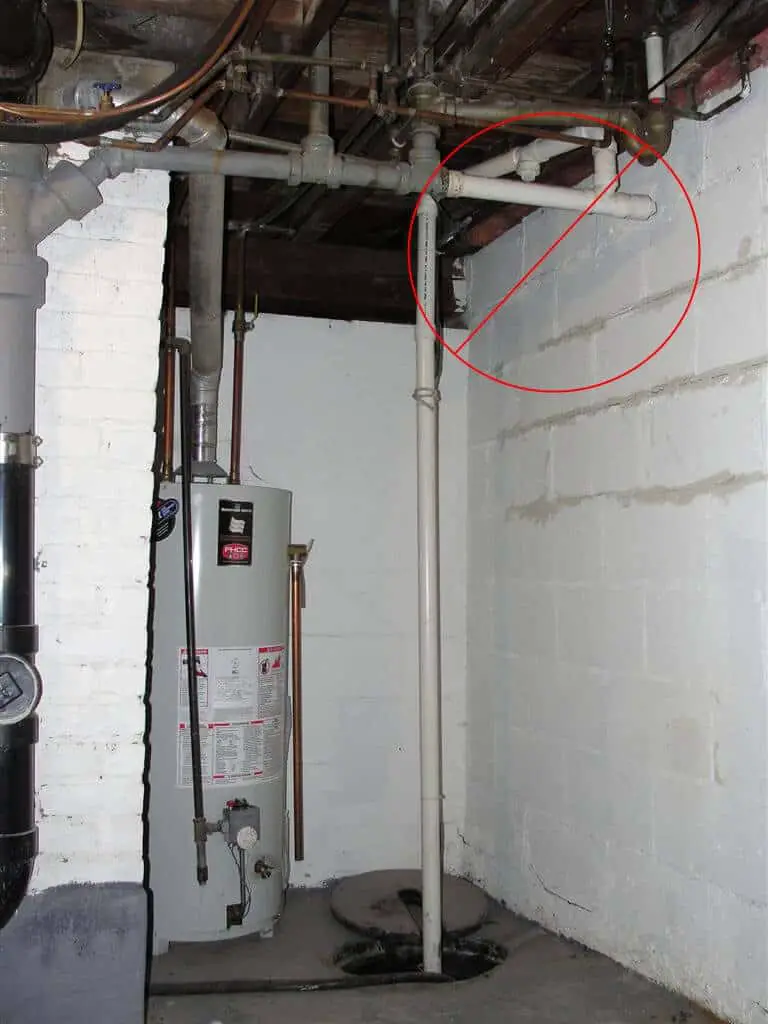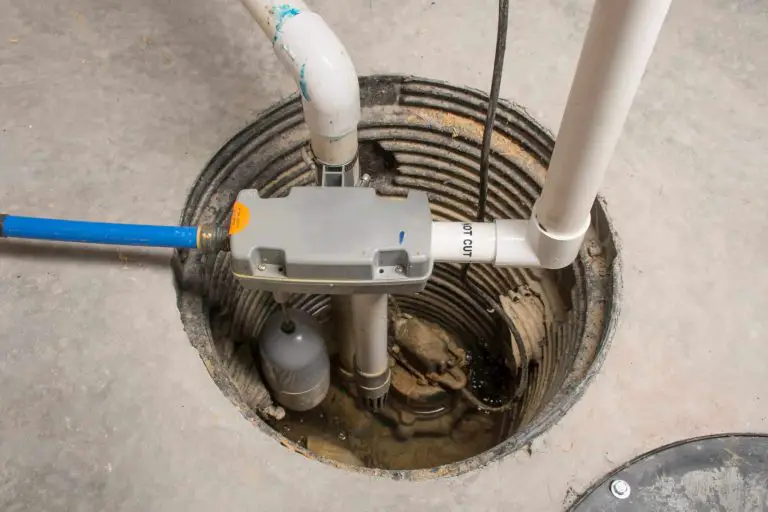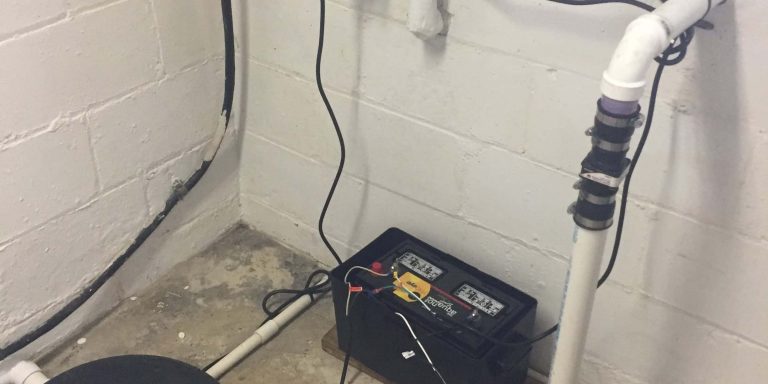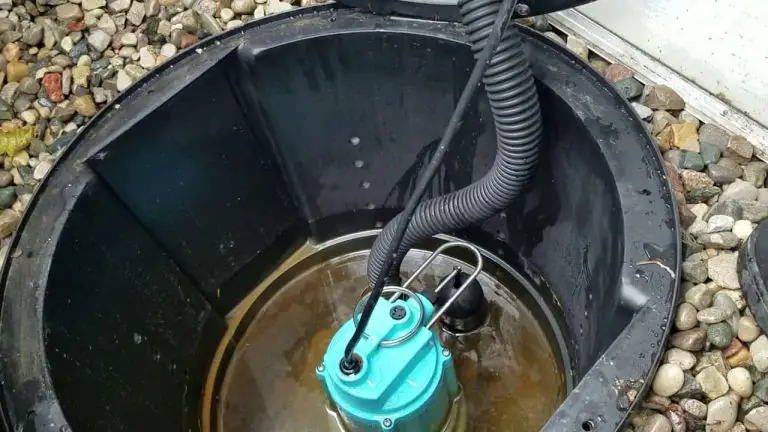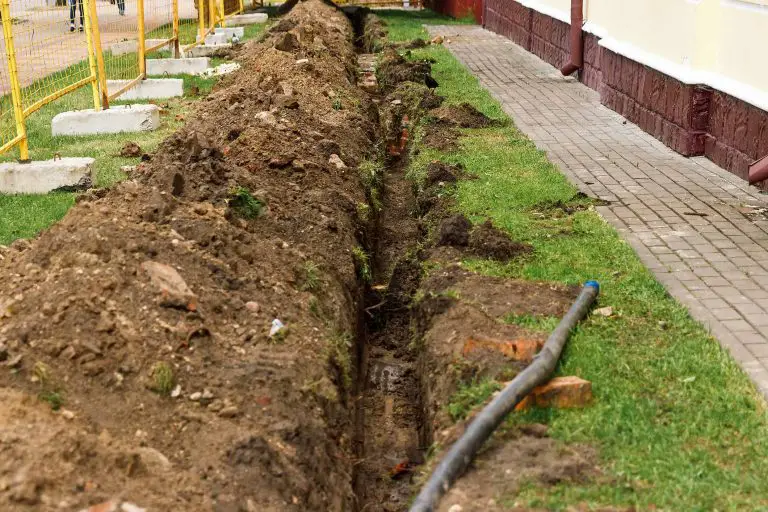Can Water Feedback Through a Sump Pump
Yes, water feedback can occur through a sump pump. This is when the water level in the sump pit rises and falls, causing the pump to turn on and off repeatedly. This can be caused by a number of factors, including a faulty float switch, an obstructed discharge pipe, or a clogged intake screen.
A sump pump is a device that is used to remove water that has accumulated in a sump pit. The water is typically pumped out of the pit and away from the home or business. Sump pumps can be used to remove groundwater, stormwater, or even wastewater.
Water feedback through a sump pump can occur if the pump is not properly installed or maintained. If water feedback does occur, it can cause the pump to work harder than necessary and potentially damage the pump. Water feedback can also lead to flooding in the basement or crawl space where the sump pit is located.
To avoid water feedback, make sure that your sump pump is installed by a professional and that it is regularly maintained. If you suspect that water feedback might be occurring, contact a plumber or other qualified professional to inspect your sump pump system.
6 Things Sump Pump Owners NEED to Know
Sump Pump Full of Water
If your sump pump is full of water, there are a few possible explanations. The most likely explanation is that the pump itself is faulty and needs to be replaced. However, it’s also possible that there is something blocking the inlet or outlet of the pump, preventing it from draining properly.
In either case, you’ll need to take action to fix the problem so that your sump pump can continue to do its job.
If you suspect that the problem is with the pump itself, the first thing you should do is check for any visible damage. If there are cracks or other damage to the housing of the pump, it will need to be replaced.
Even if there doesn’t seem to be any physical damage, it’s still possible that something has gone wrong internally and replacement will be necessary. If you’re not sure whether or not the pump can be repaired, it’s best to err on the side of caution and replace it.
If you think that there may be something blocking the inlet or outlet of the pump, you’ll need to take a closer look.
It’s possible that debris has gotten into either opening and is preventing water from flowing freely. This can often happen after heavy rains when flooding has occurred. Carefully remove any debris that you see and then test the pump again to see if it works properly.
In some cases, neither of these solutions will fix the problem and you’ll simply need to buy a new sump pump. When shopping for a replacement, pay attention to both quality and price so that you get a good deal on a product that will last for many years.
How Does Water Get into Sump Pit
A sump pit is a hole in the floor of your home that collects water and drains it away. The water comes from several sources, including rainwater, groundwater, and condensation. When this water enters the sump pit, it must be pumped out of the pit and away from your home to prevent flooding.
There are many ways for water to get into a sump pit. One common source is rainfall. When it rains, the rainwater can seep into the ground around your home and eventually make its way into the sump pit.
Groundwater is another source of water that can enter the sump pit. This is water that has soaked into the ground and is now moving through soil or rock until it reaches your basement or crawl space. Condensation can also cause water to collect in the sump pit.
This happens when humid air in your home comes into contact with a cold surface, such as a concrete floor or wall. The moisture in the air condenses on these surfaces and drips down into the sump pit.
If you have a sump pump installed in your sump pit, it will turn on automatically when enough water has collected in the pit and pump it out of your home so that flooding does not occur.
If you don’t have a sump pump, you’ll need to remove the water from the pit manually using a bucket or other container.
Sump Pump Sounds Like Running Water
If you have a sump pump in your home, it’s important to know what to listen for when it’s running. Sump pumps are designed to move water out of your basement or crawlspace and keep it from accumulating. But if you start hearing strange noises coming from your sump pump, it could be a sign that something is wrong.
One of the most common sump pump sounds is a loud, continuous running noise. This can be caused by a number of things, but the most likely culprit is an overworked pump trying to move too much water. If you hear this sound, it’s important to check the level of water in your sump pit and make sure it isn’t rising too quickly.
If it is, you may need to adjust the float switch on your pump so that it turns off sooner.
Another possible cause of a continuously running sump pump is a blockage in the discharge pipe. This can happen if debris gets caught in the pipe or if the pipe becomes frozen during cold weather.
If you suspect a blockage, try disconnecting the discharge pipe and flushing it out with water. You should also check the screen at the bottom of your sump pit to make sure there isn’t anything blocking the intake hole.
If your sump pump starts making strange noises, don’t ignore them!
These sounds can be warning signs that something is wrong and needs to be fixed before serious damage occurs.
Sump Pump Sounds Like Washing Machine
If your sump pump sounds like a washing machine, there’s a good chance that something is wrong with the impeller. The impeller is the part of the pump that moves water through the system, and if it’s not working properly, it can create a lot of noise. There are a few things you can do to try to fix the problem:
– First, check to see if the impeller is dirty or clogged. If it is, clean it off and see if that fixes the noise.
– If the impeller is clean but still making noise, try adjusting the tension on the belts that connect to it.
This can sometimes help quiet down a noisy pump.
– If neither of those solutions works, you may need to replace the impeller entirely. This is usually a fairly simple repair that any qualified technician can handle.
Sump Pump Making Noise After Rain
If your sump pump is making noise after rain, it’s likely due to one of two things: either the pump itself is failing, or there’s something blocking the discharge pipe.
If the pump itself is failing, you’ll need to replace it. But if there’s something blocking the discharge pipe, you may be able to clear it yourself.
First, check the outlet of the discharge pipe for any debris that may be causing a blockage. If you see anything, try to remove it with a plunger or a plumber’s snake.
If that doesn’t work, or if you can’t get to the outlet of the discharge pipe, you may need to call a plumber.
They’ll be able to clear the blockage and get your sump pump working properly again in no time!
How to Stop Sump Pump Banging Noise
If your sump pump is making a banging noise, there are a few things you can do to try to fix the issue. First, check to see if the pump is properly installed. If it is not, then you will need to have it professionally installed.
Second, check the discharge pipe to make sure that it is not blocked or kinked. If it is, then you will need to clear the blockage or replace the pipe. Finally, check the impeller to make sure that it is not damaged or clogged.
If it is, then you will need to clean or replace the impeller.
How Does a Sump Pump Work
Sump pumps are an important part of keeping your basement dry. But how do they work? Let’s take a look.
A sump pump is installed in a sump pit, which is usually located in the lowest point of your basement. Water enters the pit through drains or seepage and collects in the pit. When the water level gets high enough, it activates the float switch on the sump pump, which turns on the pump.
The pump then sends the water up through a discharge pipe and out of your home. Once the water is gone, the float switch shuts off the pump and it waits for the next time it’s needed.
Sump pumps are a great way to keep your basement dry and free from flooding.
If you live in an area with a lot of rain or snowmelt, or if your home has poor drainage, a sump pump can be a lifesaver.
Sump Pump Making Noise Every Few Minutes
If your sump pump is making noise every few minutes, it’s likely due to a problem with the float switch. The float switch is what tells the pump to turn on and off, based on the water level in the sump pit. If the float switch is stuck in the “on” position, the pump will run continuously.
This can cause the pump to overheat and break down.
If your sump pump float switch is stuck, you’ll need to replace it with a new one. You can purchase a new float switch at most hardware stores or online retailers.
Be sure to get one that’s compatible with your specific model of sump pump.
Once you have a new float switch, simply remove the old one and install the new one in its place. Then, test out your sump pump to make sure it’s working properly.
If it still seems to be running constantly, there may be another issue at play (such as a clogged intake screen).
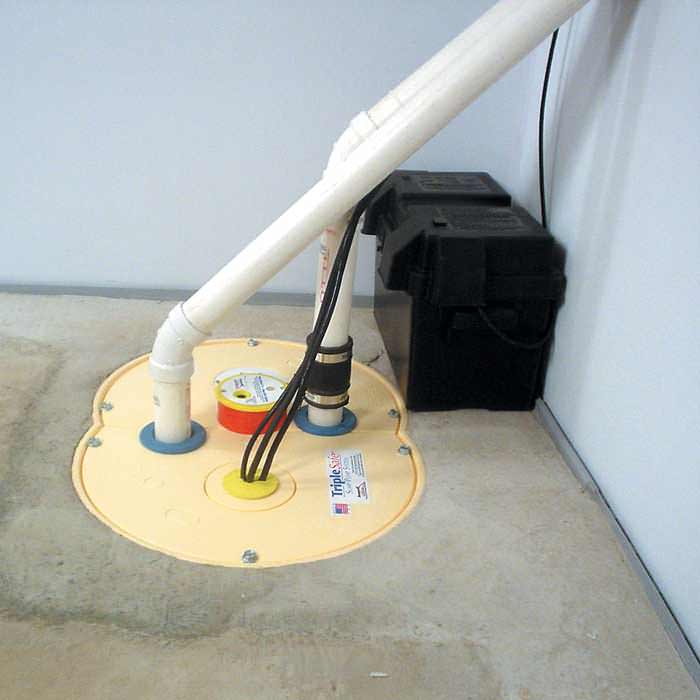
Credit: www.connecticutbasementsystems.com
Can Water Come Up from Sump Pump?
If your home is built on a foundation that’s lower than the surrounding land, it’s likely that you have a sump pump. This type of pump is installed in a pit (or “sump”) at the lowest point in your basement or crawlspace, and its job is to remove water that has seeped into your home.
Sump pumps are very effective at keeping your basement dry, but they can only do their job if there’s enough free space around them for water to flow into.
If your sump pit becomes filled with water (due to a heavy rainstorm, for example), then the pump won’t be able to do its job and water could start rising in your basement.
So, can water come up from a sump pump? Yes, it’s possible – but it’s not likely.
If you have a properly installed and maintained sump pump, it should be able to handle even the heaviest downpours without any problems.
Why Do I Hear Water Running in My Sump Pump?
If you have a sump pump, it’s important to know how it works and what to do if there are problems. One common issue that can occur is hearing water running in your sump pump. This can be caused by a few different things, so it’s important to troubleshoot the problem to figure out the cause.
One possibility is that the float switch is stuck in the “on” position. This can happen if the switch becomes jammed or corroded. If this is the case, you’ll need to replace the float switch.
Another possibility is that there is something blocking the intake of water into the sump pit. This could be a build-up of sediment or debris, or even a toy that has fallen into the pit. Clearing whatever is blocking the intake should fix the problem.
If you’re still hearing water running in your sump pump after checking these two things, it’s possible that there is a leak in either the discharge pipe or somewhere else in the system. You’ll need to contact a professional to help you locate and repair any leaks.
Why Does Water Come Back the Sump Pump?
A sump pump is a device that is installed in the basement of a home. It is used to remove water that has accumulated in the sump pit. The water is typically pumped out of the pit and away from the house.
Water can enter the sump pit in a number of ways. Groundwater can seep into the pit through cracks in the foundation or walls. This is especially common during periods of heavy rain or snowmelt.
Water can also enter the pit via drain pipes from gutters, washing machines, or other appliances.
Once water has entered the sump pit, it must be removed to prevent flooding and damage to your home. The sump pump does this by activated when the water level in the pit reaches a certain point.
The pump then turns on and pumps the water out of the pit and away from your home.
It is not uncommon for water to re-enter the sump pit after it has been pumped out. This can happen for a number of reasons, such as:
The ground around your home may be saturated with water, causing groundwater to continue seeping into your sump pit even after it has been emptied.
If you live in an area with high rainfall, you may need to pump out your sumppit more frequently than homes in drier areas.
Can Heavy Rain Overwhelm a Sump Pump?
A sump pump is designed to remove water that has accumulated in a sump basin, typically found in the basement of homes. The water is typically pumped out of the home and away from the foundation to prevent flooding. Sump pumps can be overwhelmed by heavy rain if the rainfall is excessive and/or prolonged.
If your sump pump is overwhelmed by heavy rain, you may notice that water begins to back up into your basement or crawl space. This can lead to significant flooding and damage to your home. To avoid this, it is important to make sure that your sump pump is properly sized for your home and that it has a backup power source in case of a power outage.
Conclusion
If you have a sump pump in your home, you may be wondering if water can feedback through the pump. The answer is yes, water can feedback through a sump pump, but it is not likely to happen. There are several reasons why water might feedback through a sump pump, but most of them are due to improper installation or maintenance of the pump.
If you have a sump pump in your home, make sure it is installed properly and maintained so that you don’t have to worry about water feedback.

